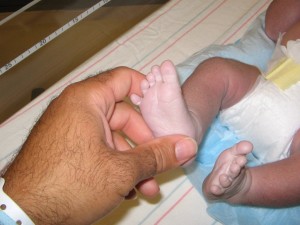
Newborn baby. Credit: Wikipedia
Babies are a tiny package of wonderful, but their minds are very mysterious. What do they think, and how do they perceive the outside world? Even if they had the chance to explain this, how could they with a brain that completely lacks vocabulary? Are babies’ perceptions like ours?
So many questions asked about these mysterious minds, and a recent paper published October 19 2015, offers some insight. Andrew Bremner of Goldsmiths, University of London and his colleagues observed tickling responses in infants and adults, the study was published in the Current Biology journal.
The research focused on 4-month-old babies, 6-month-old babies and adults and their reactions to remote controlled tickling sensations. During the study, the legs or arms are crossed and their foot or hand is tickled. How the individual responded was quite interesting. So, the left hand (now crossed over to the right side) gets tickled, they would see the right side of the body get tickled, but feel it on their left hand. The mismatch between sight and touch can interfere when correctly saying which hand was touched. The same method was used for the feet.

Newborn baby. Credit: Wikimedia Commons
Unfortunately, I could not find any video footage but the paper includes detailed figures and diagrams.
The researchers wondered if the same responses would come from infants with little visual experience. It turns out that 6-month old babies and adults were both fooled by the cross-over, but 4-month-old babies didn’t fall for the trick. With only a 2-month gap, the younger babies were more in tuned with their self and oblivious to the outside world.
Bremner suggests that young babies don’t link their physical body to the outside world, this is learned during the 2 month period. Young babies live in a very different world; one where visual objects are not necessarily connected to the physical being.
As babies grow and learn, they start making these connections and become more alike. They gain knowledge and lose the mysteriousness they were born with. Wouldn’t it be amazing to fully understand what that tiny island is like living on? Maybe one day.
Danielle Marcotte
